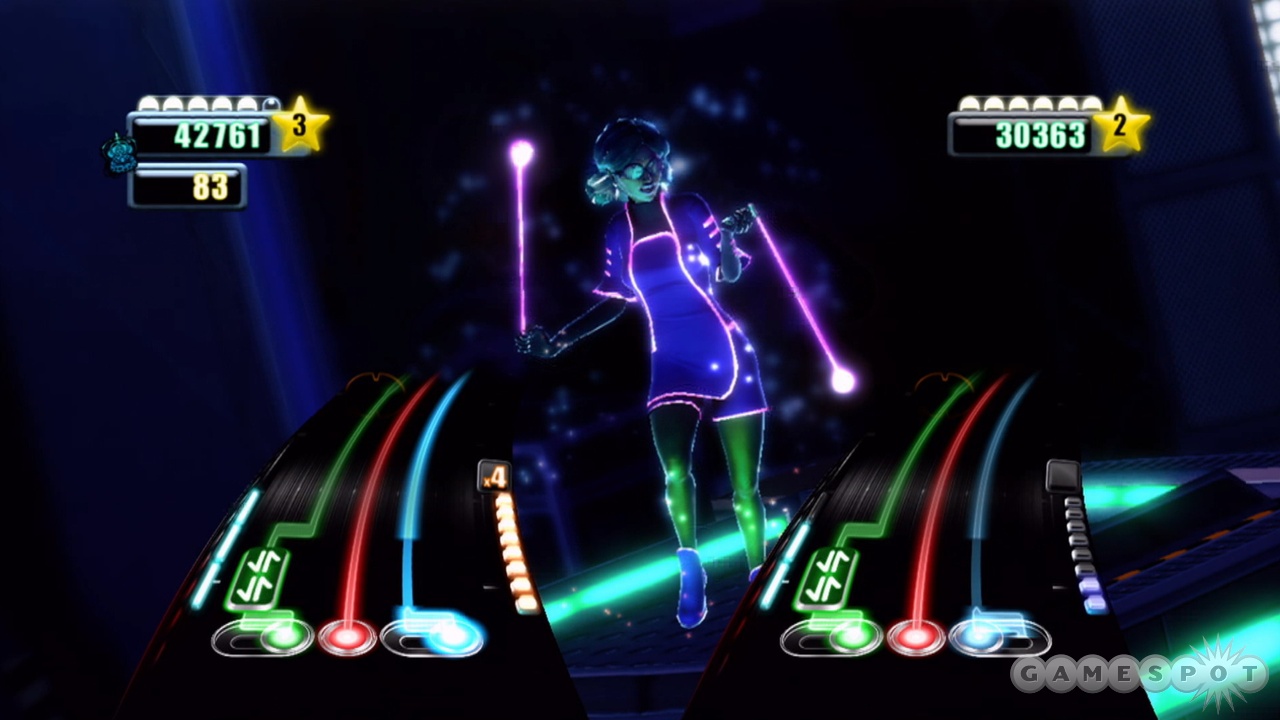As is the case with almost every rhythm game out there, playing DJ Hero will not prepare you to be an actual DJ. The songs are premixed, the sound effects are preloaded, and the wheel (just one) of steel is actually plastic. Yet, as is also the case with many rhythm games, this is no barrier to having a whole lot of fun. DJ Hero comes with a turntable peripheral that is well engineered and responsive, though it may take a little ingenuity and creative furniture rearrangement to find your optimal playing position. There's a large, diverse catalog of energetic mixes to choose from, many of which are fun just to listen to, let alone play. As you get the hang of tapping, scratching, and crossfading, DJ Hero grabs a hold of you like the best rhythm games do, drawing you into the music and triggering the adrenal rush of performance. Unfortunately, the price of admission to this show is steep: the game and the required turntable cost as much as two full-price games, and significantly more than other single-instrument rhythm games. And those hoping to flex some creative muscle will likely be disappointed with the limited opportunities to do so. Yet despite these drawbacks, DJ Hero is immensely entertaining, and manages to earn its place as a sparkling new star in the rhythm game heavens.
The key element is the wireless turntable peripheral. It's a few inches longer than a horizontally positioned Xbox 360, half as tall, and much, much lighter. It's made up of two pieces: one contains the spinning circular platter, and the other houses the crossfader, effects knob, and other buttons. It is built to accommodate lefties and righties alike, and though it features a few aesthetic touches (like the silver bumps that ring the platter edge), it definitely focuses on function over form. It is so light that it initially feels a little flimsy, but once you get used to it, you'll find it very well suited to the task. The lightness actually encourages you to be more deft with your motions, something that comes in handy once things get hectic.
But don't worry--things get hectic only if you want them to. There is a wide array of difficulty modes to help you get the hang of the relatively few actions you'll have to perform. On the platter are three buttons (green, red, blue), and you tap these to correspond with the note jewels that come down the note highway, much like in Guitar Hero. You hold down one of these buttons and move the platter back and forth to scratch (that is, make that "wikka wikka" sound that people make when they are pretending to be DJs). On easier difficulties, you can move the platter in any direction you want, but as things get tougher, you'll encounter directional scratches that require you to move in certain ways. The noise the scratch makes is prerecorded in the mix, so you don't have any creative control there. The only chance you get to add your own sounds comes courtesy of the effects knob. This allows you to tweak the timbre of the mix during certain sections and lets you choose which of your five preset samples will play when you tap the red button during freestyle sections. You can also earn the ability to briefly rewind the song and play a certain section again. This can be used to boost your score or repeat a favorite section, though it works only in single-player and will occasionally ruin your score multiplier as if you had made a mistake, even if you think you're in the clear. From a creative standpoint, these outlets are minimal, but it can still be fun to add your own spice to the mix.

In addition to tapping and scratching, you'll have to start crossfading once you hit medium difficulty. Every track in DJ Hero is a mix of two songs, and crossfader is used to highlight different songs at different points in the mix. The crossfader is a simple gray tab that moves on a slider between far left, far right, and a central position marked by a small divot. When the crossfader is in the center, both tracks play equally and the screen shows your three colored paths of light (green, red, blue) evenly spaced. The green and blue paths represent the two songs in the mix, and pushing the crossfader all the way left or right will also bump one of those two paths out to the left or right. When you are done highlighting one song, you slide the crossfader back to the center position to resume playing both, and this can be a little tricky. The divot in the center serves as an indicator of the center position, but it doesn't catch the crossfader tab. This allows you to fade from far left to far right unimpeded, but it also makes it easy to overshoot the center. Leaving a finger in the middle can help, and applying some downward force can help you hit the divot a little harder, but it's one of the toughest things to master, and it feels like the turntable design could have been a little more helpful in this regard.
So you're going to need to practice if you hope to crank up the difficulty. DJ Hero is very accommodating to all skill levels, from rhythm game newcomers to hardcore plastic thrashers. Lower difficulty levels start out with simple requirements, and no matter what level you're on, you can never do so badly that you fail a song and it abruptly stops. If you make a mistake, you may hear awkward static or scratches, and one of the tracks may drop out temporarily. Hitting a note or nailing a crossfade will bring that track back up immediately, and the track will come back automatically after a certain amount of time. DJ Hero is geared toward letting you enjoy the music, and the difficulty levels range from super easy to blisteringly hard. Tougher difficulties require faster and more frequent tapping, scratching, and crossfading, and they challenge you to do many of these things at the same time. You'll also see crossfade spikes, which require you to move the crossfader out and back in a quick stabbing motion. If you nail certain sections, you'll earn euphoria. Activating euphoria with the quick press of a button doubles your score multiplier and automatically performs your crossfades for as long as it lasts.
All this can add up to some pretty hectic action, but if you get the hang of it, it's much more exciting and rewarding. This is not just because you are challenging yourself and succeeding, but because you are more deeply engaged with the song. What might be one long scratch section on a lower difficulty can turn into a number of quicker sections with some directional scratches and rhythmic button taps thrown in. You are more active, and your actions more directly correspond with the music pumping out of your TV. It feels less like you're just playing along, and more like you're helping to create music. This is the thrill that the best rhythm games manage to capture, and DJ Hero does it in a unique new way, thanks to the new peripheral and diverse setlist.
From 50 Cent to Blondie, from Dizzee Rascal to Queen, and from Herbie Hancock to Daft Punk, there is a huge breadth of artists represented here, and many of the mixes were produced by famous DJs like Grandmaster Flash and DJ Z-Trip. Some songs are reused in different mixes, like Rihanna's "Disturbia," but each one feels like a unique track, and there are an impressive 93 different mixes. In single-player, you play through themed sets and earn stars for your performances, which in turn unlock new sets, venues, DJs, and gear. You can face off with a friend if you both have a turntable, or you can hop online and find some competition. You can also put another peripheral to work in the DJ and guitar mixes. These mixes aren't the best the game has to offer, but they are a way to get another player involved without two copies of the game. You can also plug in a mic and add your own emcee chatter, but this isn't a big improvement over just yelling.

A great tracklist and a solid new peripheral make DJ Hero a lot of fun to play, and the music is more likely to get your party going than that of most any other rhythm game. So how much would you pay for it? Games bundled with peripherals are naturally going to be more expensive, but with a manufacturer's suggested retail price of $119.99, DJ Hero feels overpriced. It's a great game, but it costs as much as two great games, and though there are downloadable tracks lined up, there's no guarantee you'll be able to use the turntable in any other game. Yet despite the sizable cost, DJ Hero is an enticing purchase. It captures the thrill of spinning together hot songs to make an electrifying mix, and it's one show that fans of rhythm games will not want to miss. Just hope you can afford the cover charge.